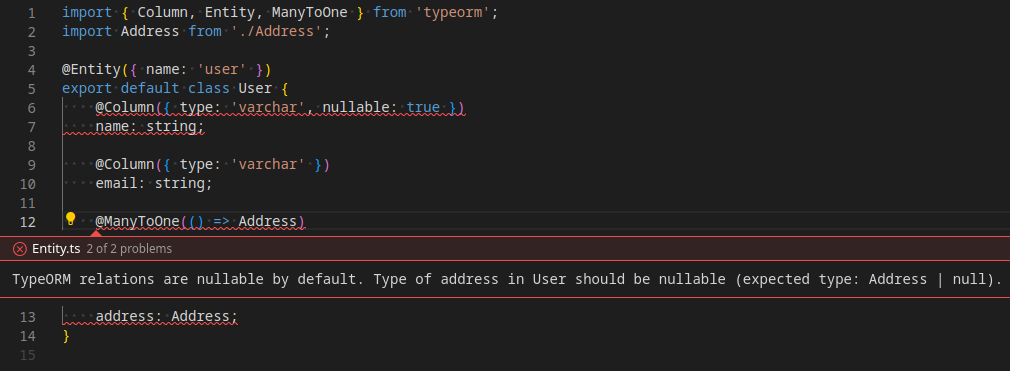An ESLint plugin to catch mistakes if the TypeORM column types and TypeScript types aren't consistent.
Install the package for the plugin:
npm install -D eslint-plugin-typeorm-typescriptUpdate .eslintrc.json with the plugin to the plugins key, and add it to the rules:
{
"plugins": ["typeorm-typescript"],
"rules": {
"typeorm-typescript/enforce-column-types": "error",
"typeorm-typescript/enforce-relation-types": "error",
"typeorm-typescript/enforce-consistent-nullability": "error"
}
}TypeORM has no way to statically analyze if there is an inconsistency in the annotated TypeScript types. With the addition, that there are some confusing rules around nullability (relations are nullable by default, but columns aren't), it makes it easy to make mistakes. These ESLint rules will spot these issues, and suggest fixes.
TypeORM data types and TypeScript types should be consistent. It includes the primitive types (e.g. VARCHAR -> string)
and the nullability. By default columns are non-nullable, but if the nullable: true option is set, it should be unioned
with null in the TypeScript types too.
It also handle primary columns (number by default), create and update columns (date by default) and delete columns
(date and nullable by default).
{
"rules": {
"typeorm-typescript/enforce-column-types": "error"
}
}Examples of incorrect code for this rule:
class Entity {
// Should be string
@Column({ type: "varchar" })
name: number;
// Should be string | null
@Column({ type: "varchar", nullable: true })
name: string;
// Should be Date | null
@DeleteDateColumn()
deletedAt: Date;
}Examples of correct code for this rule:
class Entity {
// TypeORM data type and TypeScript type are consistent
@Column({ type: "varchar" })
name: string;
// Nullability is correct
@Column({ type: "varchar", nullable: true })
name: string | null;
}TypeORM relation types and TypeScript types should be consistent. Because the names are similar, it can be easily confused
that ManyToOne should be singular, and OneToMany an array. Additionally, OneToOne and ManyToOne are nullable,
which is an easy mistake to make.
{
"rules": {
"typeorm-typescript/enforce-relation-types": "error"
}
}Examples of incorrect code for this rule:
class Entity {
// Should be Other | null
@OneToOne(() => Other)
@JoinColumn()
other: Other;
// Should be Other[]
@OneToMany(() => Other, (other) => other.entity)
other: Other;
// Should be Other | null
@ManyToOne(() => Other)
other: Other;
// Should be Other[]
@ManyToMany(() => Other)
@JoinTable()
other: Other;
// Should be Other | null
@OneToOne(() => Other)
@JoinColumn()
other: Another | null;
}Examples of correct code for this rule:
class Entity {
// Join is correctly nullable...
@OneToOne(() => Other)
@JoinColumn()
other: Other | null;
// ...or explicitly marked nullable: false
@OneToOne(() => Other, { nullable: false })
@JoinColumn()
other: Other;
// *ToMany rules are an array
@OneToMany(() => Other, (other) => other.entity)
others: Other[];
}The main source of confusion with TypeORM decorators is that the nullable flag is different between columns and relations.
It is further complicated by being able to set the default value in some places and omit from others. Enable this rule to make sure
that either only the non-default value is set (no parameters or non-default) or the nullable must be specified every time (always).
{
"rules": {
// If you want to report an error for unnecessary nullables
"typeorm-typescript/enforce-consistent-nullability": "error", // or
"typeorm-typescript/enforce-consistent-nullability": ["error", { "specifyNullable": "non-default" }],
// If you want to force setting nullable everywhere to avoid confusion
"typeorm-typescript/enforce-consistent-nullability": ["error", { "specifyNullable": "always" }],
},
}Examples of incorrect code for this rule:
With { "specifyNullable": "non-default" }:
class Entity {
// Columns are non-nullable by default, remove it
@Column({ type: "varchar", nullable: false })
name: number;
// Relations are nullable by default, remove it
@OneToOne(() => Other, { nullable: true })
@JoinColumn()
other: Other | null;
}With { "specifyNullable": "always" }:
class Entity {
// Mark this to nullable false to make it clear
@Column({ type: "varchar" })
name: number;
// Mark this to nullable true to make it clear
@OneToOne(() => Other)
@JoinColumn()
other: Other | null;
}Examples of correct code for this rule:
With { "specifyNullable": "non-default" }:
class Entity {
// Nullability only defined when it is different than default
@Column({ type: "varchar", nullable: true })
middleName: number | null;
@Column({ type: "varchar" })
name: number;
@OneToOne(() => Other)
@JoinColumn()
other: Other | null;
}With { "specifyNullable": "always" }:
class Entity {
// Nullable is set everywhere, no default behaviour is implied
@Column({ type: "varchar", nullable: true })
middleName: number | null;
@Column({ type: "varchar", nullable: false })
name: number;
@OneToOne(() => Other, { nullable: true })
@JoinColumn()
other: Other | null;
}